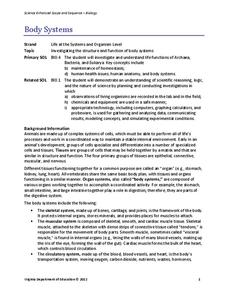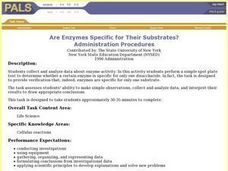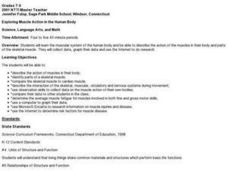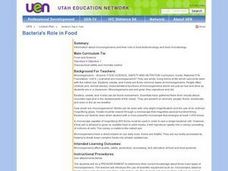Curated OER
Pump It Up!
Young scholars design a pumping device that will effectively pump fluid through a model "cardiovascular system." They explore the effects of too much and too little pressure on a circulatory system.
University of Minnesota
Mirroring Emotions
Do you ever give your class the "teacher look"? Without saying a word, they become silent and engaged (hopefully). How do they know what you're thinking? Explore the concept of nonverbal communication and how it relates to our...
Virginia Department of Education
Body Systems
The human body is an amazing thing! Explore the body with your high school class as they investigate each system in detail. They learn components of each organ system and disease processes that can negatively affect general health and...
University of Minnesota
Dendritic Spines Lab
This is your brain on drugs ... literally! Your neuroscientists-in-training examine the evidence of drug use on the human brain and how neurons change their connectivity when altered by drugs. They then work together to create testing...
University of Minnesota
Neurotransmission Model
Don't lose your marbles — you'll need them for a lesson on neurotransmission. Young scholars build a neurotransmission model using marbles, beads, rubber bands, string, and other elements. After studying specific neurotransmitters,...
Curated OER
What is Biotechnology?
Young consumers explore the concept of biotechnology as it pertains to the foods they eat, economics, and agriculture. They watch several videos, explore a website, complete worksheets, and engage in class discussion. Son they'll know...
Curated OER
Ruminating on the Digestive System
Students compare the digestive systems of the buffalo and of the zebra, diagram their systems, and compare their lengths. In this digestive system lesson plan, students learn about their diets as well.
Science 4 Inquiry
The Real Story of Where Babies Come From
Pupils learn about both male and female anatomy before understanding how they work together to make a baby. Scholars discover new vocabulary, create a presentation on fertilization, and discuss related topics.
Curated OER
Atoms and Elements: An Introduction
Students are able to discuss the difference between a proton, a neutron and an electron. They also can explain the difference between an ionic and a covalent bond. Students know the main structure of atoms and molecules. Student are able...
Curated OER
Benefits of Indoor Plants
Students diagram a plant. In this Science lesson, students explore the concept of photosynthesis focusing on the oxygen production. Students calculate the amount of plants needed to filter the air in their classroom.
Curated OER
COMPARISON OF FOUR-, SIX-, AND EIGHT-bp CUTS IN CALF THYMUS DNA
Students use this laboratory exercise, restriction enzymes to recognize a four-, six-, and eight-nucleotide sequence. Assuming that the four component nucleotides (A, C, T, G) are distributed randomly within a DNA molecule, then any...
Curated OER
Are Enzymes Specific for Their Substrates?
Students discover enzyme to substrate specificity. The experiment uses samples of glucose and lactose in combination with the enzyme lactase. Students observe the reaction between the lactose and the lactase; the lack of a reaction...
Curated OER
Exploring Muscle Action in the Human Body
Students collect and graph data and use the internet to research the skeletal muscles.
Curated OER
Hierarchy Theory and Biotic Hierarchy
Pupils examine the hierarchy theory and biotic organization by playing a teacher-created card game matching groups of items, such as organelles, in suits of four. They discuss the reasons for their hierarchical organization of the biotic...
Curated OER
Mitosis And Meiosis
In this science worksheet, students answer 13 multiple-choice questions about mitosis and meiosis. For example, "Interphase is defined as..."
Common Sense Press
What is the Skeletal System?
Young scholars investigate the human skeletal system. In this biology lesson, students trace the outline of their body onto butcher paper and fill in the names of the bones. Young scholars use an overhead transparency of the human...
Curated OER
Body Voyager
Students explore the significance of a resting and an active heart rate. In this heart instructional activity students chart data on their pulse and draw a diagram of the heart.
Curated OER
Nucleic Acids and Protein Synthesis
Tenth graders complete a vocabulary assignment based on terms in the unit. They complete appropriate worksheets as each section of the unit is completed. They participate in classroom discussions. They construct a model of a DNA molecule.
Curated OER
Science: Mirrored Movements
This lesson provides students with a lab experience during which students construct a basic electric circuit and use it to explore dexterity skills. A chance to construct and operate a tool that extends a person's grasping ability and to...
Curated OER
PARAMECIUM RESPONSES TO STIMIULI
Students design the test they use to examine, how the paramecium move, feed, and react to different types of stimuli such as a drop of vinegar. They conduct a lab experiment using a microscope.
Curated OER
The Human Memory
This is a well-designed, creative lesson to help young scholars learn more about the human memory. Working in pairs, students complete tasks and gather data. Excellent websites for resources are also provided.
Curated OER
Sizing Up the Supersize Croc
Students examine and compare traits of humans and crocodiles. In this crocodile lesson students use a ratio to estimate the height of a person and compare that to a crocodile.
Curated OER
Bacteria's Role in Food
Students grow bacteria cultures on agar in petri dishes and do a plate count. They participate in a yogurt making lab to see how bacteria produce lactic acid. They prepare a recipe and identify fungi, fermentation and the role of...
Curated OER
What's Inside
Students become more familiar with life science in the context of the scientific method which helps them to become familiar with the various kinds of life science diagrams they may see on a GED science test.























